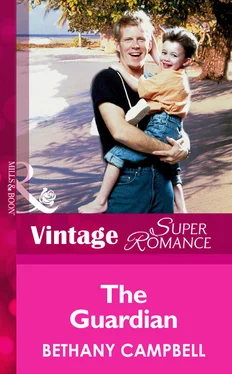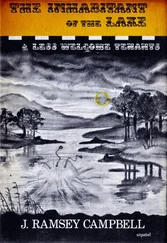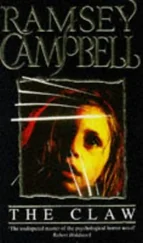They walked against the breeze, and Hawkshaw tried not to notice the way the soft wind sculpted Kate’s pale-green shirt to her breasts. She’d plaited her hair into one gleaming braid, but strands had come loose and fluttered about her face like delicate streamers of fire.
Overhead the gulls shrieked and squabbled in flocks, but the more majestic birds wheeled alone, aloof from them and from each other.
“Hawkshaw! Hawkshaw! What’s that?” Charlie cried. He nearly danced in the surf as he pointed upward at an elegant black shape sailing high in the blue.
“A frigate bird,” Hawkshaw told him. “They call it the ‘magnificent’ frigate bird.”
Charlie stood, staring up for a moment, then ran on, playing tag with the waves.
Kate put her hands in the pockets of her shorts and cast him a sideways look. “How many times today have you heard that?”
“Heard what?” he said.
He’d put on a shirt for her benefit, but now he unbuttoned it and let it blow back in the wind. He liked the feel of the salt wind on his bare flesh.
She looked up at the sky, the hovering frigate bird. “That question: ‘Hawkshaw, what’s that?’”
“About four thousand,” he said.
“You don’t get tired of answering?”
He shrugged. “Not really.”
“It’s very good of you to be so patient with him”
He was not good at taking compliments or thank-yous. He shrugged again and looked out to sea. “It’s okay.”
“He gets very—hyper—about things sometimes,” she said. “When he’s interested in something, the questions never stop.”
“Kids are curious,” he said.
“If he gets too curious, if he becomes a pest, you have to be firm with him, that’s all. I don’t want him to be a bother to you.”
“He’s no bother,” Hawkshaw said. That was God’s truth. Hawkshaw had nothing else he needed to do, not one damn thing.
“His attention usually flits around a lot,” she said. “It’s been a problem. But when he’s really interested in something, he can become almost obsessive. So I’ll understand—” Her voice trailed off, pensive, resigned.
Hawkshaw leaned down, scooped up a fragment of broken conch shell from the surf and hurled it into the sea. “He’s a smart kid,” he said.
“He is smart,” she agreed. “And he’s very imaginative—the doctors say that’s really in his favor. That’s a plus.”
He stole a glance at her. Her face, framed by the rippling strands of loose hair, was sober. She kept her gaze on the boy running and wading ahead of them.
“He’s also an only child,” she said. “That’s actually a plus, too, in a case like this. He needs extra time. Extra attention. And all these things have been hard on him, his father’s death, and then—”
She went silent
“The stalker?” Hawkshaw added.
“Yes. Him. God, I don’t even have a name for him. He’s trying to destroy our lives, and I don’t even know his name. I hate it. I hate him.”
She shot him a look so volatile that it startled Hawkshaw. Beneath her sadness was passion, a firestorm of it. Then she looked down, as if ashamed of letting her emotions fly free for even an instant.
“It’s not about me so much,” she said, kicking at the surf. “It’s Charlie, what it’s done to him. That’s what I can’t forgive.”
Hawkshaw frowned. To him, it was the mother, not the boy, who seemed hurt and disturbed.
“Charlie seems fine,” he said. “Maybe you worry too much.”
She gave him another sharp look, just as turbulent as the first. “I can’t worry too much. Charlie’s got a special problem. It’s affected his learning. He—he can’t read. He has to repeat first grade.”
She acted as if her words were some sort of horrible confession. Hawkshaw said, “That’s no sin.”
Her chin jerked up, and her eyes went straight back to the boy. “It’s hardly a blessing. He hates school—with a passion. He misbehaves. He doesn’t make friends. He has problems with self-esteem.”
“Self-esteem,” Hawkshaw repeated, sarcasm in his voice. To him, it sounded as if she’d read too many psychology books.
She said, “Self-esteem is a big issue for children with attention deficiencies.”
“Issue,” he echoed in the same tone.
“Never mind,” she said curtly.
“He’s a good kid. What more do you want?”
“He’s good here,” she answered. “He’s good now. But you make it seem like a big vacation. I mean, it’s kind of you, and he loves it, but it’s not the real world.”
“It’s my real world,” said Hawkshaw. “And you didn’t answer. What more do you want from him?”
She shook her head. “I’m not asking that he turn into a genius. I just want him to be able to read, for God’s sake. That’s all.”
“I see,” said Hawkshaw.
She sighed and passed a hand over her hair to tame it, but it refused to be tamed. “I know,” she said. “I sound like a neurotic mother. Maybe I am. I don’t even know. Being stalked is hard work, you know? It wears you down. You lose perspective. Oh, hellfire.”
Against his will he gave her a one-cornered smile. “I hear the pay’s lousy, too.”
“It is lousy.” She didn’t smile in return, but a dimple appeared in her cheek. It played intriguingly and for all too short a time. He wanted it to come back.
“But,” she said, trying to smooth her hair again, “I’m not a freeloader. I pull my own weight I see a lot of things around your house that need to be done. I want you to let me do them.”
Конец ознакомительного фрагмента.
Текст предоставлен ООО «ЛитРес».
Прочитайте эту книгу целиком, купив полную легальную версию на ЛитРес.
Безопасно оплатить книгу можно банковской картой Visa, MasterCard, Maestro, со счета мобильного телефона, с платежного терминала, в салоне МТС или Связной, через PayPal, WebMoney, Яндекс.Деньги, QIWI Кошелек, бонусными картами или другим удобным Вам способом.












